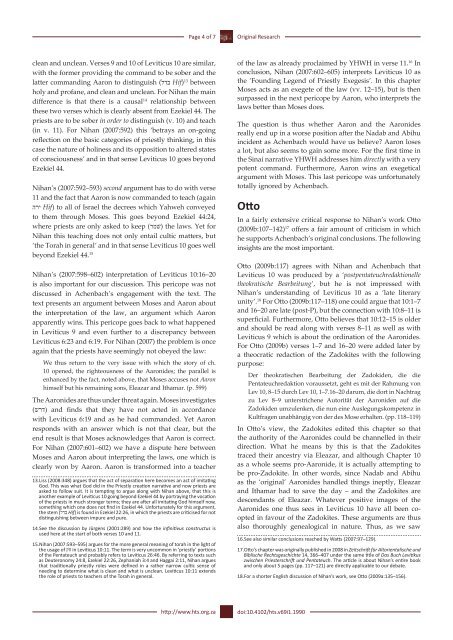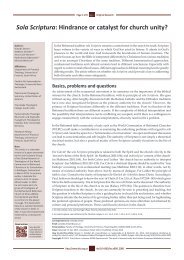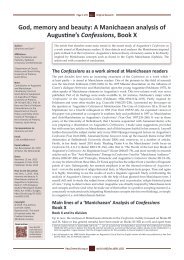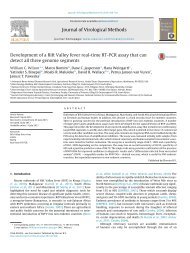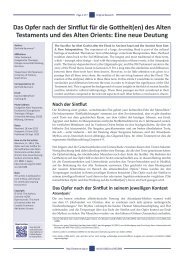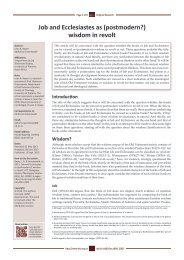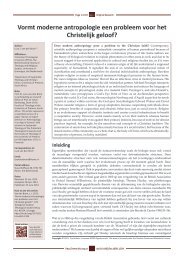Leviticus 10 and possible priestly power struggles - HTS Teologiese ...
Leviticus 10 and possible priestly power struggles - HTS Teologiese ...
Leviticus 10 and possible priestly power struggles - HTS Teologiese ...
Create successful ePaper yourself
Turn your PDF publications into a flip-book with our unique Google optimized e-Paper software.
Page 4 of 7<br />
Original Research<br />
clean <strong>and</strong> unclean. Verses 9 <strong>and</strong> <strong>10</strong> of <strong>Leviticus</strong> <strong>10</strong> are similar,<br />
with the former providing the comm<strong>and</strong> to be sober <strong>and</strong> the<br />
latter comm<strong>and</strong>ing Aaron to distinguish בדל) Hif) 13 between<br />
holy <strong>and</strong> profane, <strong>and</strong> clean <strong>and</strong> unclean. For Nihan the main<br />
difference is that there is a causal 14 relationship between<br />
these two verses which is clearly absent from Ezekiel 44. The<br />
priests are to be sober in order to distinguish (v. <strong>10</strong>) <strong>and</strong> teach<br />
(in v. 11). For Nihan (2007:592) this ‘betrays an on-going<br />
reflection on the basic categories of <strong>priestly</strong> thinking, in this<br />
case the nature of holiness <strong>and</strong> its opposition to altered states<br />
of consciousness’ <strong>and</strong> in that sense <strong>Leviticus</strong> <strong>10</strong> goes beyond<br />
Ezekiel 44.<br />
Nihan’s (2007:592–593) second argument has to do with verse<br />
11 <strong>and</strong> the fact that Aaron is now comm<strong>and</strong>ed to teach (again<br />
Hif) to all of Israel the decrees which Yahweh conveyed ירה<br />
to them through Moses. This goes beyond Ezekiel 44:24,<br />
where priests are only asked to keep (ׁשמר) the laws. Yet for<br />
Nihan this teaching does not only entail cultic matters, but<br />
‘the Torah in general’ <strong>and</strong> in that sense <strong>Leviticus</strong> <strong>10</strong> goes well<br />
beyond Ezekiel 44. 15<br />
Nihan’s (2007:598–602) interpretation of <strong>Leviticus</strong> <strong>10</strong>:16–20<br />
is also important for our discussion. This pericope was not<br />
discussed in Achenbach’s engagement with the text. The<br />
text presents an argument between Moses <strong>and</strong> Aaron about<br />
the interpretation of the law, an argument which Aaron<br />
apparently wins. This pericope goes back to what happened<br />
in <strong>Leviticus</strong> 9 <strong>and</strong> even further to a discrepancy between<br />
<strong>Leviticus</strong> 6:23 <strong>and</strong> 6:19. For Nihan (2007) the problem is once<br />
again that the priests have seemingly not obeyed the law:<br />
We thus return to the very issue with which the story of ch.<br />
<strong>10</strong> opened, the righteousness of the Aaronides; the parallel is<br />
enhanced by the fact, noted above, that Moses accuses not Aaron<br />
himself but his remaining sons, Eleazar <strong>and</strong> Ithamar. (p. 599)<br />
The Aaronides are thus under threat again. Moses investigates<br />
<strong>and</strong> finds that they have not acted in accordance (דרש)<br />
with <strong>Leviticus</strong> 6:19 <strong>and</strong> as he had comm<strong>and</strong>ed. Yet Aaron<br />
responds with an answer which is not that clear, but the<br />
end result is that Moses acknowledges that Aaron is correct.<br />
For Nihan (2007:601–602) we have a dispute here between<br />
Moses <strong>and</strong> Aaron about interpreting the laws, one which is<br />
clearly won by Aaron. Aaron is transformed into a teacher<br />
13.Liss (2008:348) argues that the act of separation here becomes an act of imitating<br />
God. This was what God did in the Priestly creation narrative <strong>and</strong> now priests are<br />
asked to follow suit. It is tempting to argue along with Nihan above, that this is<br />
another example of <strong>Leviticus</strong> <strong>10</strong> going beyond Ezekiel 44 by portraying the vocation<br />
of the priests in much stronger terms; they are after all imitating God himself now,<br />
something which one does not find in Ezekiel 44. Unfortunately for this argument,<br />
the stem בדל) Hif) is found in Ezekiel 22:26, in which the priests are criticised for not<br />
distinguishing between impure <strong>and</strong> pure.<br />
14.See the discussion by Jürgens (2001:289) <strong>and</strong> how the infinitivus constructus is<br />
used here at the start of both verses <strong>10</strong> <strong>and</strong> 11.<br />
15.Nihan (2007:593–595) argues for the more general meaning of torah in the light of<br />
the usage of חק ֹ in <strong>Leviticus</strong> <strong>10</strong>:11. The term is very uncommon in ‘<strong>priestly</strong>’ portions<br />
of the Pentateuch <strong>and</strong> probably refers to <strong>Leviticus</strong> 26:46. By referring to texts such<br />
as Deuteronomy 24:8, Ezekiel 22:26, Zephaniah 3:4 <strong>and</strong> Haggai 2:11, Nihan argues<br />
that traditionally <strong>priestly</strong> roles were defined in a rather narrow cultic sense of<br />
needing to determine what is clean <strong>and</strong> what is unclean. <strong>Leviticus</strong> <strong>10</strong>:11 extends<br />
the role of priests to teachers of the Torah in general.<br />
of the law as already proclaimed by YHWH in verse 11. 16 In<br />
conclusion, Nihan (2007:602–605) interprets <strong>Leviticus</strong> <strong>10</strong> as<br />
the ‘Founding Legend of Priestly Exegesis’. In this chapter<br />
Moses acts as an exegete of the law (vv. 12–15), but is then<br />
surpassed in the next pericope by Aaron, who interprets the<br />
laws better than Moses does.<br />
The question is thus whether Aaron <strong>and</strong> the Aaronides<br />
really end up in a worse position after the Nadab <strong>and</strong> Abihu<br />
incident as Achenbach would have us believe? Aaron loses<br />
a lot, but also seems to gain some more. For the first time in<br />
the Sinai narrative YHWH addresses him directly with a very<br />
potent comm<strong>and</strong>. Furthermore, Aaron wins an exegetical<br />
argument with Moses. This last pericope was unfortunately<br />
totally ignored by Achenbach.<br />
Otto<br />
In a fairly extensive critical response to Nihan’s work Otto<br />
(2009b:<strong>10</strong>7–142) 17 offers a fair amount of criticism in which<br />
he supports Achenbach’s original conclusions. The following<br />
insights are the most important.<br />
Otto (2009b:117) agrees with Nihan <strong>and</strong> Achenbach that<br />
<strong>Leviticus</strong> <strong>10</strong> was produced by a ‘postpentateuchredaktionelle<br />
theokratische Bear beitung’, but he is not impressed with<br />
Nihan’s underst<strong>and</strong>ing of <strong>Leviticus</strong> <strong>10</strong> as a ‘late literary<br />
unity’. 18 For Otto (2009b:117–118) one could argue that <strong>10</strong>:1–7<br />
<strong>and</strong> 16–20 are late (post-P), but the connection with <strong>10</strong>:8–11 is<br />
superficial. Furthermore, Otto believes that <strong>10</strong>:12–15 is older<br />
<strong>and</strong> should be read along with verses 8–11 as well as with<br />
<strong>Leviticus</strong> 9 which is about the ordination of the Aaronides.<br />
For Otto (2009b) verses 1–7 <strong>and</strong> 16–20 were added later by<br />
a theocratic redaction of the Zadokites with the following<br />
purpose:<br />
Der theokratischen Bearbeitung der Zadokiden, die die<br />
Pentateuchredaktion voraussetzt, geht es mit der Rahmung von<br />
Lev <strong>10</strong>, 8–15 durch Lev <strong>10</strong>, 1–7.16–20 darum, die dort in Nachtrag<br />
zu Lev 8–9 unterstrichene Autorität der Aaroniden auf die<br />
Zadokiden umzulenken, die nun eine Auslegungskompetenz in<br />
Kultfragen unabhängig von der des Mose erhalten. (pp. 118–119)<br />
In Otto’s view, the Zadokites edited this chapter so that<br />
the authority of the Aaronides could be channelled in their<br />
direction. What he means by this is that the Zadokites<br />
traced their ancestry via Eleazar, <strong>and</strong> although Chapter <strong>10</strong><br />
as a whole seems pro-Aaronide, it is actually attempting to<br />
be pro-Zadokite. In other words, since Nadab <strong>and</strong> Abihu<br />
as the ‘original’ Aaronides h<strong>and</strong>led things ineptly, Eleazar<br />
<strong>and</strong> Ithamar had to save the day – <strong>and</strong> the Zadokites are<br />
descendants of Eleazar. Whatever positive images of the<br />
Aaronides one thus sees in <strong>Leviticus</strong> <strong>10</strong> have all been coopted<br />
in favour of the Zadokites. These arguments are thus<br />
also thoroughly genealogical in nature. Thus, as we saw<br />
16.See also similar conclusions reached by Watts (2007:97–129).<br />
17.Otto’s chapter was originally published in 2008 in Zeitschrift für Altorientalische und<br />
Biblische Rechtsgeschichte 14, 366–407 under the same title of Das Buch Levitikus<br />
zwischen Priesterschrift und Pentateuch. The article is about Nihan’s entire book<br />
<strong>and</strong> only about 5 pages (pp. 117–121) are directly applicable to our debate.<br />
18.For a shorter English discussion of Nihan’s work, see Otto (2009a:135–156).<br />
http://www.hts.org.za<br />
doi:<strong>10</strong>.4<strong>10</strong>2/hts.v69i1.1990


